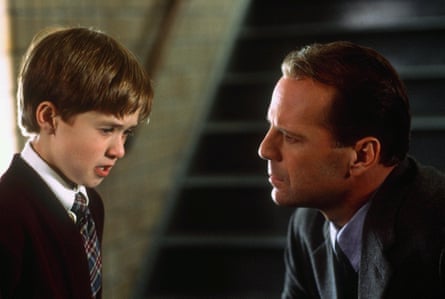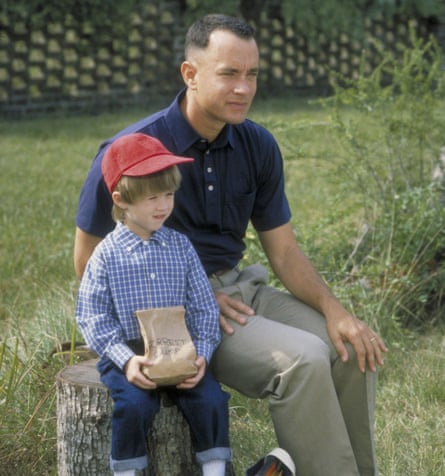Haley Joel Osment thought he was finished for the day. It was 1998 and the 10-year-old was shooting The Sixth Sense, directed by M Night Shyamalan. With 10 minutes left on set, they wanted to squeeze in a short scene. It required Osment’s terrified character, who, memorably, sees dead people, to confront a bloody ghost. Osment had to get into the right mindset, fast. The young actor threw himself against a door, again and again, until he was sufficiently shaken. “If they’d known I was going to do it, they probably would have stopped me,” he says of Shyamalan and the other adults on set. “It came to me spontaneously – and I guess it worked.”
I see little of that intensity in the 32-year-old man facing me via Zoom. Still boyish-looking, despite a dark beard, Osment is upbeat and quick to laugh. He returned to his home town of Los Angeles last autumn, after 13 years in New York, and found this house a week before lockdown, when he was shooting a forthcoming series of Goliath for Amazon. After the extraordinary success of The Sixth Sense – a box office phenomenon, his performance lauded by critics and rewarded with an Oscar nomination, while his character’s most famous line quickly became a catchphrase – he has enjoyed a different kind of career lately. He works steadily, on screen but somehow under the radar, probably not recognised as the Sixth Sense kid by most of his audiences.

In recent years, he has appeared on TV in What We Do in the Shadows, The Kominsky Method, Silicon Valley, Teachers and The Boys. Last year he had a supporting role in the Ted Bundy film Extremely Wicked, Shockingly Evil and Vile. Since lockdown, he says, there has been “endless opportunity for quiet reflection at home”, including on his time as a child star.
Though his father, Eugene, was an actor (and ran a theatre on Santa Monica Boulevard), Osment fell into acting by chance, after being spotted at the age of four in Ikea. His first screen appearance was in an ad for Pizza Hut in 1993, which led to him being approached by the casting director for Forrest Gump. Forrest Jr was only a small part for five-year-old Osment, but his screen test with Tom Hanks still circulates on social media, thanks to their heartwarming double act – and Osment’s cuteness.
Shyamalan had worried that Osment was too much of a “cherub” to cast in The Sixth Sense. But the boy was also serious-minded and precocious. For Osment’s final audition of three for The Sixth Sense, he wore a suit. The director has said he was moved to tears by the boy’s vulnerability and depth, especially in his delivery of the now-classic line: “I see dead people.”
“I’d been working with it for such a long time, the material was really ready by the time I saw him,” Osment says. His dad had helped him to prepare for the audition and shaped his early career. “His relationship to the craft was so resistant to doing stuff that didn’t have a purpose and wasn’t quality work,” says Osment. “There’s always going to be plenty of opportunities to bail out for a big pay cheque … so to have someone like that, who really cared about protecting artistic value before I was old enough to understand what that meant, was such an important influence.”

On set, Osment was also bolstered by Shyamalan and his co-star, Bruce Willis. “I don’t think I could have done it, had there not been that sense that they believed in me.” Although Shyamalan himself was only 28, and under pressure to deliver on his multimillion dollar script, he did not push that on to his cast, says Osment. “I remember him dribbling a basketball from his director’s chair between lighting changes. He just projected calm.”
Willis, too, was convinced of the film’s success, telling Shyamalan that he had felt the same way in making Pulp Fiction. There was the sense that “we were building this story together”, Osment says. In those pivotal early years, he says he never felt manipulated, or negatively motivated to perform. “That’s why it’s still something that I love doing, almost 30 years later.”
Osment was nominated for an Oscar for best supporting actor in The Sixth Sense but lost to Michael Caine. Caine praised Osment in his speech: “Haley, when I saw you I thought: well, that’s me out of it.” (“Probably a better outcome than me winning,” says Osment, warmly.)
A string of blockbusters followed – starting with, in 2000, the drama Pay It Forward, with Kevin Spacey. Allegations of Spacey’s predatory behaviour were “a shock to me, as [they were] to a lot of people”, says Osment. He says he felt “super-safe” on every film he worked on as a child – not least because he was always accompanied by either Eugene or his mother, Theresa. “They had a policy of never letting me go off alone on a shoot.” They also strived to minimise disruption to his education, even as his star continued to rise. Acting “was something I went off and did, like going to camp”, he says.
Then Osment found himself back at school, where “the big news of fifth grade” was Nintendo 64 and a new Star Wars film. It was an undeniable “shift in gear”, he says, but one that felt natural to navigate. He was not treated as a celebrity and because The Sixth Sense was classified as unsuitable for children under the age of 13, he says: “Most kids in my class didn’t even see it.”

Osment’s younger sister, Emily, 28, had “a way tougher path” to fame, says Osment, playing Miley Cyrus’s best friend, Lilly, on the Disney Channel’s Hannah Montana. “That show was squarely aimed towards creating a mania in that age group. She had to deal with a lot more strange invasions of privacy, not being able to have a normal school life. And what exacerbated all of that was she had to be on social media. I resisted until I was, like, 27.”
In 2006, aged 18, Osment moved to New York to study experimental theatre at New York University. His parents wanted him to go to college and Osment wanted the college experience. “I did work that practically nobody saw for a long time, which was not a great career move – but, ultimately, was important for me to figure out whether this was what I truly wanted to do for the rest of my life,” he says.
In 2008, he made his Broadway debut, playing a heroin addict in a revival of David Mamet’s American Buffalo, to mixed reviews. Post-graduation, in 2011, a spate of oddballs and villains followed, from an obnoxious millionaire in the film Entourage to a greasy-haired Nazi in Kevin Smith’s Yoga Hosers and a virgin teacher in Sex Ed. “That was definitely a very fun period of playing a lot of bad guys,” says Osment. He agrees it might have been a belated rebellion against his angelic childhood image: in fact, Osment says, he grew a beard “to try to hide in public. That didn’t really work at all.”
His public path through adolescence was “free of major indiscretion”, as the New Yorker approvingly put it. In 2006, driving while drunk, he overturned his car, for which he was fined, sentenced to rehabilitation and put on probation for three years. But that was the “terrible mistake” of an arrogant teenager in car-centric Los Angeles, says Osment. “It could not have had less to do with Hollywood.”
The popular narrative of the child star may be the “spectacular blowup”, he agrees, “but I think the percentage of people having a positive experience working as children is much higher than most people imagine.” You just don’t hear about the child actors who “move on to something else that works for them”, or who have such long careers their youthful roles recede in the rear view, says Osment.
“Being an actor, you can never count on things being smash successes all the time. I remember having that feeling with The Sixth Sense – like, ‘It’s not always gonna be like that.’” He hopes his next move will be behind the scenes, into writing and directing, which was part of his motivation for returning to Los Angeles, he says.
Even as he begins the next stage of his career, he does not resent being asked about the past. “I’m lucky to have a positive relationship with those periods that can sometimes be difficult for other people.” When it comes to his early success, he says: “I feel like I’m always building on it.”
